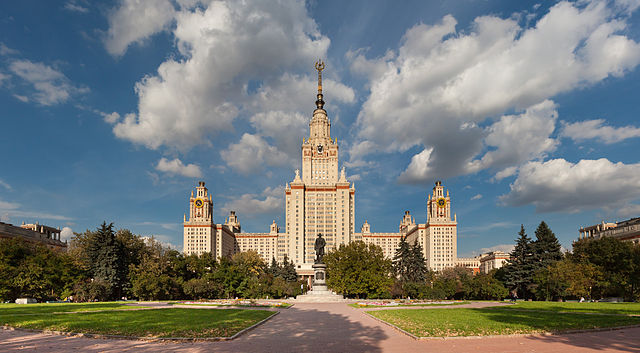-
 Moscow State University. Photo credit: Dmitry A. Mottl (via Wikicommons)
Moscow State University. Photo credit: Dmitry A. Mottl (via Wikicommons)
Universities, colleges, and academic hospitals have frozen their formal cooperation with Russia and Belarus, as requested by the government. At the same time they show support to students and employees personally affected by the war.
As expected, today the government made an appeal to cancel the cooperation with knowledge institutions in Russia and Belarus because of the invasion of Ukraine. Germany, Denmark, and the European Commission led the Netherlands in this action.
Dutch universities and colleges support the stance taken by the government. The same holds true for research financier NOW and the scientific fellowship KNAW. However, they do lament the consequences for research and education.
‘Research flourishes through international cooperation and the open exchange of knowledge, insights and ideas’, a reply reads. ‘That is why we not only take these measures, but also support those Russian and Belarusian researchers, lecturers, students and organisations that speak out against the invasion of Ukraine.
Students
There are 917 Ukrainian- and 1.653 Russian natives currently studying in the Netherlands, plus a number of Belarusian students. Additionally, there are ‘several hundred’ Ukrainian, Russian and Belarusian employees at knowledge institutions.
Minister Robbert Dijkgraaf of Education, Culture and Science appreciates the aid offered to affected students and employees. The government has mde a million euros available for their support ‘for the moment.’
Russian and Belarusian students, lecturers and researchers in the Netherlands can remain here. Dutch students in Russia and Belarus are urged to return home, provided they can do so safely.
Data and knowledge will no longer be exchanged
Among other things, the boycott means that there will be no more money transferred from Dutch institutions to Russia and Belarus and that data and knowledge will no longer be exchanged. On top of that, no new cooperative projects will be set up.
Participants from Russian and Belarusian institutions will no longer be welcome at scientific events. Researchers from those institutions will also no longer be invited as referent or committee members for judging research proposals.
Personal Contacts
‘However, many cooperations in education and research are based on peer-to-peer relations with Russian and Belarusian researchers’, the statement says. ‘Many of them have openly criticised the invasion, with great risk to their personal safety. That is why the institutions want to provide their employees with every opportunity to continue extant personal contacts with those researchers, where appropriate.’
‘In times of war and conflict, it is vital that we keep talking with these researchers’, according to the higher education institutions. Is that dangerous? That will have to be judged on a case-by-case basis. Employees can contact the department of Integral Security or the national service desk Knowledge Safety, ‘if desired.’
Dijkgraaf agrees. ‘These contacts will form the basis for normalising educational- and scientific relations at a later date’, he writes.
However, minister Dijkgraaf does call on all knowledge institutions to be especially vigilant when it comes to cybersecurity and knowledge safety. Yesterday, it was reported that Russian hackers had already succeeded in hacking dozens of Dutch routers.



